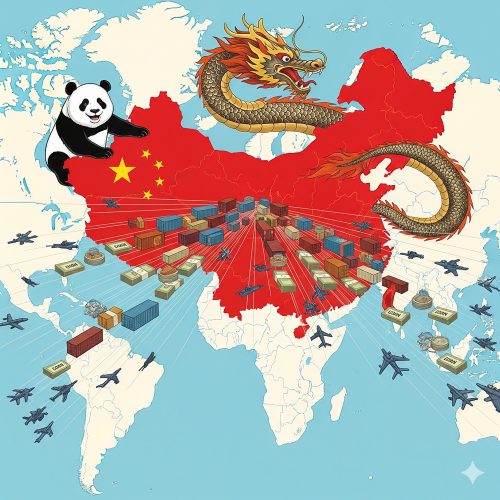How is China leveraging cultural and educational soft power (Confucius Institutes, student exchanges, diaspora networks) inside the U.S.?

China uses cultural and educational soft power to enhance its international image, promote its political agenda, and project influence within the U.S.
This is achieved through three main avenues: Confucius Institutes, student exchanges, and diaspora networks.
While some of these efforts appear benign, they're often viewed by U.S. policymakers and intelligence agencies as tools for shaping public opinion, gathering intelligence, and exerting political control.
Confucius Institutes: A Declining but Persistent Presence
Confucius Institutes (CIs) were once a cornerstone of China's soft power strategy, presenting themselves as a means to promote Chinese language and culture. They were often established on U.S. university campuses, offering language courses, cultural events, and academic scholarships.
-
Soft Power and Propaganda: The U.S. government and many critics have long argued that CIs are not merely cultural centers but rather agents of the Chinese government's propaganda and censorship. Unlike other foreign cultural institutions, such as the British Council or the Goethe Institute, CIs were directly funded and managed by the Chinese government. This led to concerns that they would promote a sanitized, pro-Beijing view of China, while censoring sensitive topics like Tibet, Taiwan, and Tiananmen Square.
-
Academic Freedom and Self-Censorship: The presence of CIs on campus has been linked to concerns about academic freedom. There have been reports of Chinese officials pressuring U.S. university administrators or faculty to avoid hosting events or discussions on topics that are politically sensitive to Beijing. The fear of losing funding from the CIs, or jeopardizing other academic partnerships with China, can lead to self-censorship, where universities and professors avoid controversial subjects to maintain a good relationship with their Chinese partners.
-
The Crackdown and Decline: In recent years, U.S. government scrutiny has led to a significant decline in the number of CIs. The National Defense Authorization Act for FY2021 included a provision that restricted Department of Defense (DoD) funding to universities that hosted a CI. This move, along with growing awareness of the risks, prompted nearly all of the approximately 100 CIs in the U.S. to close or restructure as of late 2023. While the number of these institutes has dwindled, China continues to fund similar programs through alternative, less-scrutinized organizations.
Student Exchanges: A Double-Edged Sword
Chinese students studying in the U.S. represent a significant source of revenue for American universities and a channel for cultural exchange. However, this has also become a major source of security concern.
-
Economic and Cultural Benefits: Chinese international students are the largest group of foreign students in the U.S., generating billions of dollars in tuition revenue for American universities. They also contribute to U.S. academia by participating in research and enriching cultural diversity on campuses.
-
Intelligence Concerns: The U.S. government has raised alarms about the potential for Chinese students, particularly those in STEM fields, to serve as "non-traditional collectors" of intellectual property and sensitive research. This is often linked to China's "Military-Civil Fusion" strategy, where civilian technological advancements are leveraged for military purposes. A key policy concern is China's 2017 National Intelligence Law, which obligates Chinese citizens to "support, assist, and cooperate with state intelligence work." While the vast majority of Chinese students are here for legitimate academic pursuits, this law creates a potential for coercion and makes it difficult for U.S. universities to distinguish between legitimate students and those with ties to Chinese intelligence.
-
The Role of CSSAs: The Chinese Students and Scholars Association (CSSA), which exists on many U.S. college campuses, is another point of contention. While officially a student-run organization, critics allege that some CSSA chapters have links to the Chinese embassy or consulates and are used to monitor and report on the activities of Chinese students. They have been accused of organizing protests against Chinese dissidents on campus and surveilling their peers.
Diaspora Networks: Mobilizing the Overseas Chinese Community
China’s efforts to influence the U.S. extend to its diaspora communities, a strategy often referred to as "diaspora diplomacy." This is primarily orchestrated through the United Front Work Department of the Chinese Communist Party (CCP).
-
Co-opting and Controlling: The United Front seeks to co-opt and control overseas Chinese communities, leveraging ethnic and nationalistic pride to align their interests with Beijing's. This includes targeting Chinese Americans and Chinese nationals living in the U.S. through a variety of organizations, from hometown associations and cultural groups to business and professional networks.
-
Shaping Political Discourse: These networks are used to influence U.S. policy and political discourse. They can be mobilized to lobby American politicians, protest against events or statements critical of the CCP, or support pro-Beijing candidates. For example, some groups have organized demonstrations against the U.S. government's policies on Hong Kong, Taiwan, or human rights in Xinjiang.
-
Intimidation and Surveillance: A more concerning aspect is the use of these networks for intimidation and surveillance. There have been documented cases of Chinese nationals living in the U.S. being harassed, threatened, or monitored by agents of the Chinese government. This is an attempt to enforce a climate of fear and prevent them from speaking out against the CCP.
- Questions and Answers
- Opinion
- Motivational and Inspiring Story
- Technology
- Live and Let live
- Focus
- Geopolitics
- Military-Arms/Equipment
- Ασφάλεια
- Economy
- Beasts of Nations
- Machine Tools-The “Mother Industry”
- Art
- Causes
- Crafts
- Dance
- Drinks
- Film/Movie
- Fitness
- Food
- Παιχνίδια
- Gardening
- Health
- Κεντρική Σελίδα
- Literature
- Music
- Networking
- άλλο
- Party
- Religion
- Shopping
- Sports
- Theater
- Health and Wellness
- News
- Culture

